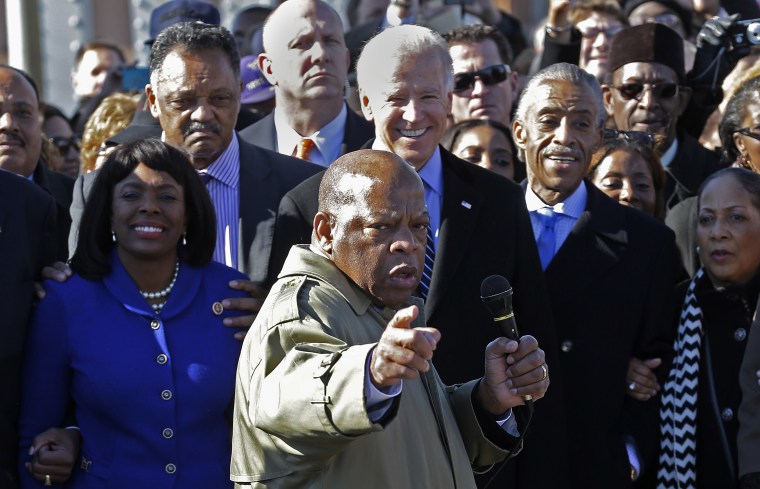States have been swift to take action on new voter suppression measures in the wake of the Supreme Court ruling that effectively gutted the Voting Rights. After less than two weeks, already six states have moved forward with new voter suppression measures, but that action has also inspired a renewed push for voting rights from the civil rights community in the wake of the Court's decision, and few may be more passionate about the cause than John Lewis.
The Georgia congressman was a freedom rider who was beaten within an inch of his life as he marched in Selma, Ala., in support of voting rights for all Americans.
"I truly believe that what the Supreme Court did was to stab, to put that dagger deep in the heart of the Voting Rights Act of 1965," he said on Saturday's PoliticsNation from Essence Festival in New Orleans.
The decision to restore the provisions destroyed by the ruling now rests in the hands of Congress, and while some lawmakers in Washington have been uncertain if not outright pessimistic about the likelihood of passing the new legislation, Lewis has no such doubt.
"We're coming together—both Democrats and Republicans—on the House side, and they will do the same thing on the Senate side," he said. "And we're going to pass another Voting Rights Act."
Lewis also weighed in on the idea, floated by some, to name the new version of the legislation after him.
"I'm flattered that some on the House side, some of the leadership, want to name the new Voting Rights Act after me," he said. "The only thing I tried to do, almost 50 years ago, was just try to make it possible for all of our citizens to be able to register and vote, for people to be able to run for office and get elected, and I just gave a little blood, but you're right, some of my friends and colleagues and sisters gave their very lives."
"We've come too far, made too much progress, to go back now. And we cannot go back and we will not go back," he added.
Lewis also acknowledged the progress the country has made since the early days of his civil rights work, specifically referencing the signs of segregation, one set that read "whites" and another that read "coloreds" that once existed almost universally across the South.
"Those signs are gone, and they will not return," he said.
"But we still have the invisible signs in our society. There are still too many people that have been left out and left behind. And that's why it's important for you and others to organize a march," he said to Sharpton. "Not just to celebrate, not just to commemorate, but to rededicate our lives."
He also reiterated a message he's used before, saying that the election of President Barack Obama was not the achievement of Dr. King's dream, but "just a down payment."
"We're not there yet, brother. We've got work to do."
